Boost Your Manufacturing Efficiency with VIMANA's OEE MONITORING SOFTWARE
Minimize Downtime, Maximize Productivity and Improve Overall Performance with Our Trusted OEE Software.
Automate real-time data collection and get visibility into your machines and manufacturing facilities.
Monitor, analyze, and improve production capacity, machine uptime, cycle time, and product quality.
FREE PRODUCTION ASSESSMENT
"*" indicates required fields
Understand How VIMANA Can Help You WITH OEE Machine Monitoring

Increase visibility to your operation to include machines, lines, and worker productivity.

Monitor, analyze, and predict machine performance and health.

Measure, standardize, and track OEE and other critical machine and manufacturing KPIs.

Communicate and empower workers with data-driven insights to improve processes and performance.

Understand root causes of bottlenecks and waste to guide continuous improvement.
Global Discrete Manufacturers of all Sizes Trust VIMANA
VIMANA’s OEE Machine Monitoring software improved machine utilization and increased capacity by 20%.
“We are using VIMANA Elevate, smart manufacturing analytics, to make decisions and improve awareness across the facility. Our operators have welcomed the objective data, and we are fully transparent with the analytics”.
Elisabeth Smith,
President & CEO, Acutec Precision Aerospace, Inc.

Watch a 2 Minute Demo
Quickly Connect and Collect Machine Data From Anywhere
Get you shop floor connected in a day. Use VIMANA’s OEE tracking software to capture data from sensors, systems, employees, and machines (using standard protocols (MTConnect, OPC UA).
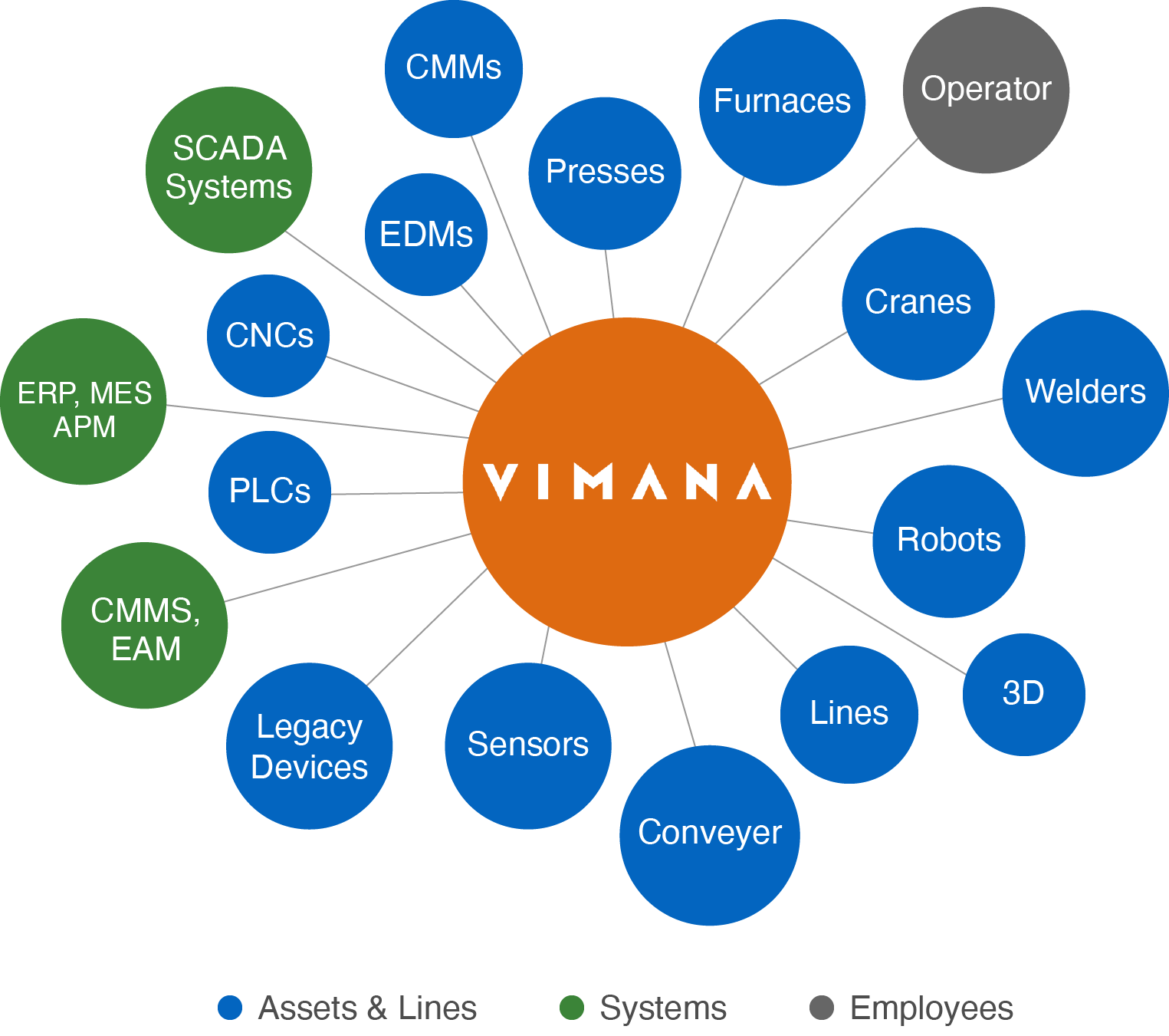
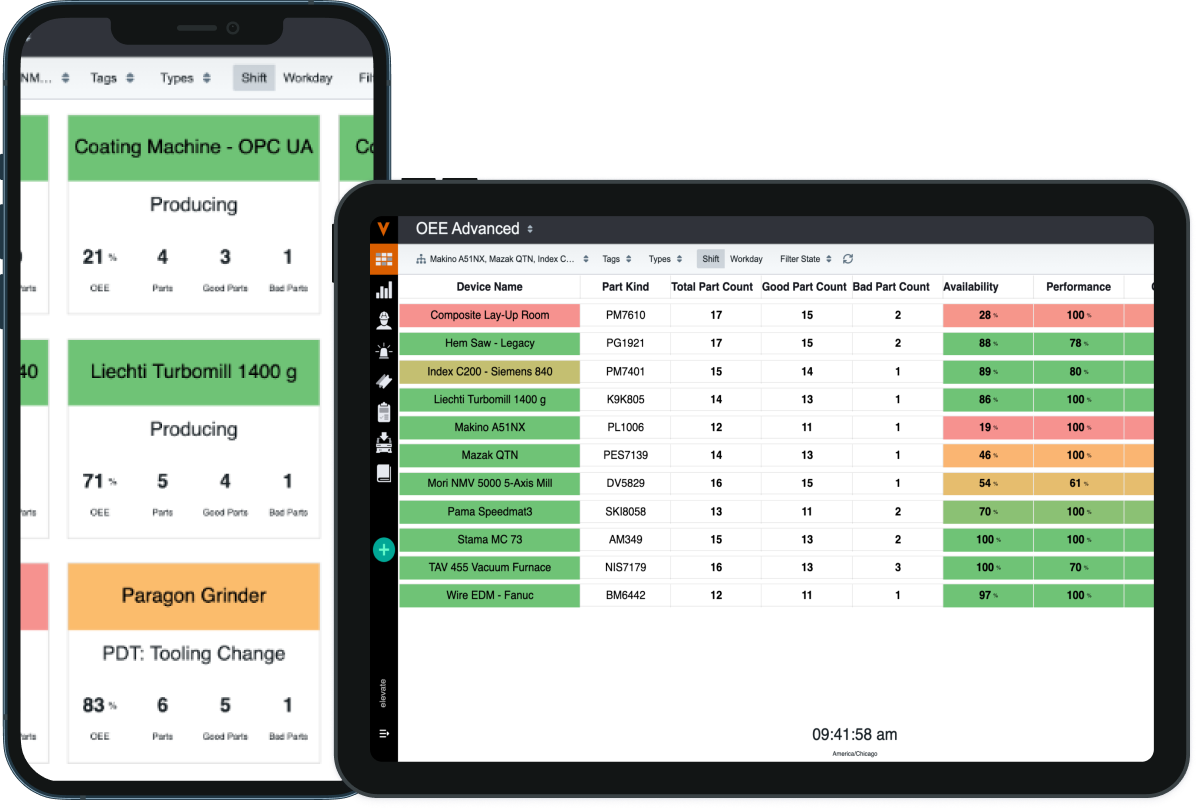
Visualize and Monitor Machine Performance Remotely
Easily access and customize pre-built OEE Dashboards, Reports, and Alerts without coding for rapid time to value. Get real-time, accurate OEE measurements revealing all elements of the OEE calculation: asset availability, cycle time, and quality metrics.
Analyze and Predict Performance
Get insights into waste and root causes. Diagnose and predict machine downtime and maintenance problems. Use condition monitoring to identify machines operating beyond expected thresholds and predict machine performance or product quality risks.
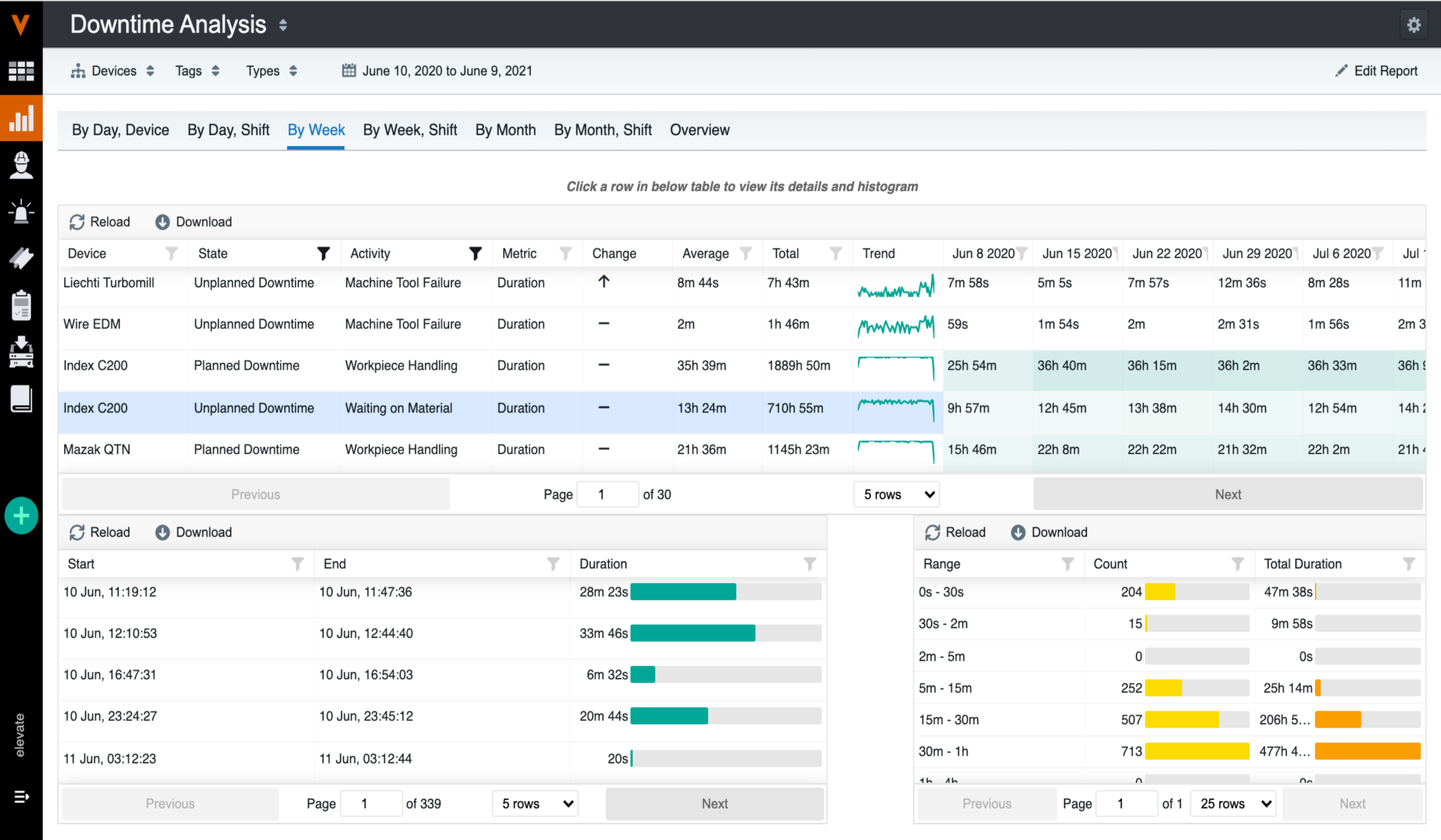
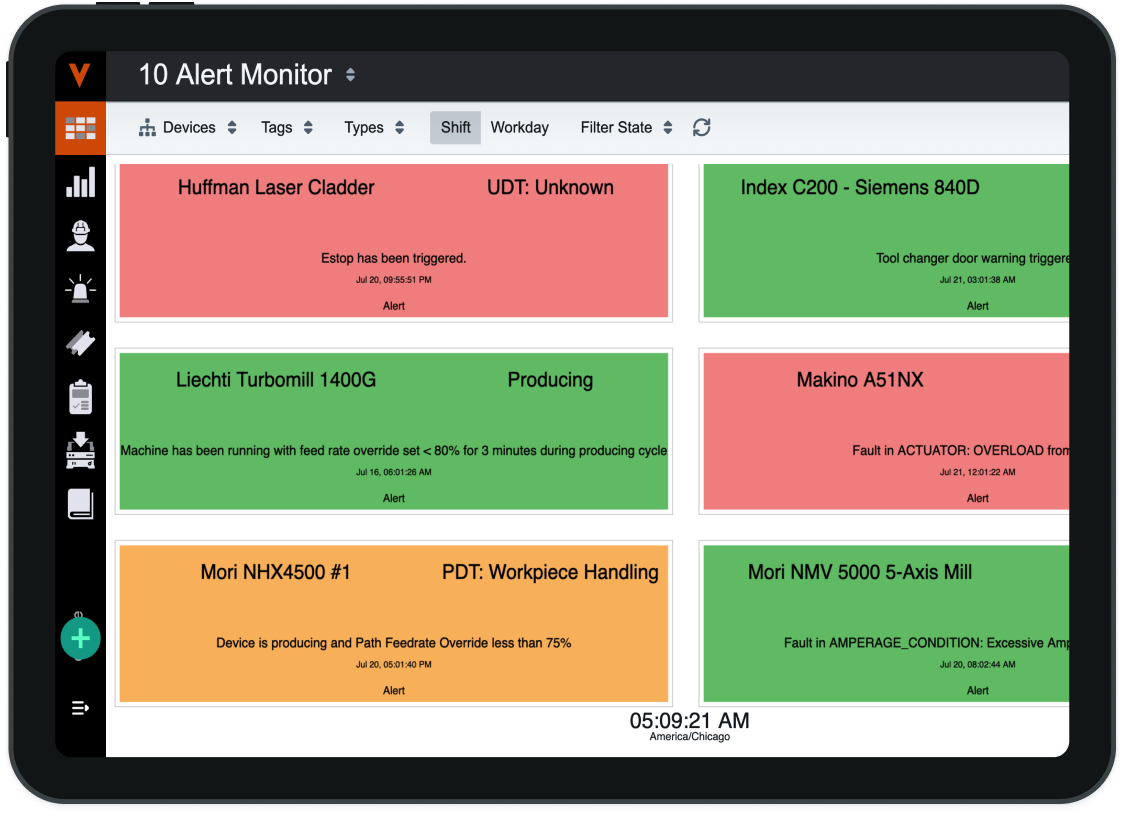
Communicate and Take Proactive Action to Lean Processes
OEE / Overall Equipment Effectiveness FAQ
Get insights into waste and root causes. Diagnose and predict machine downtime and maintenance problems. Use condition monitoring to identify machines operating beyond expected thresholds and predict machine performance or product quality risks.
OEE stands for Overall Equipment Effectiveness. It is a key performance indicator (KPI) used in manufacturing to measure the efficiency and effectiveness of production processes and equipment. OEE provides insights into how well a manufacturing process or machine is performing by quantifying the actual output as a percentage of its maximum potential output under ideal conditions.
OEE is typically calculated using three main factors:
- Availability: This measures the portion of scheduled production time during which the equipment is operating and producing quality products. It takes into account factors such as downtime due to breakdowns, changeovers, and other planned or unplanned stoppages.
- Performance: This represents the speed at which the equipment is running compared to its maximum designed speed. It considers factors such as slow cycles, idling, and minor stoppages that affect the production rate.
- Quality: This accounts for the percentage of good-quality products produced compared to the total products produced. It includes defects, rework, and scrap.
The formula for calculating OEE is: OEE = Availability × Performance × Quality
Manufacturers track OEE for several reasons:
- Performance Monitoring: OEE provides a comprehensive view of how well manufacturing processes or equipment are performing. It helps manufacturers identify bottlenecks, inefficiencies, and areas for improvement.
- Process Optimization: By analyzing the individual components of OEE (availability, performance, and quality), manufacturers can pinpoint specific areas that need attention and optimization. This could involve reducing downtime, increasing production speed, or improving product quality.
- Resource Allocation: OEE data can guide decisions about where to allocate resources, such as maintenance efforts or investments in new equipment. It helps prioritize areas that have the greatest potential for improvement.
- Continuous Improvement: OEE is closely tied to the concept of continuous improvement. By monitoring OEE over time and setting improvement targets, manufacturers can engage in ongoing efforts to enhance efficiency and effectiveness.
- Data-Driven Decision Making: OEE provides quantifiable data that facilitates data-driven decision-making. Instead of relying on guesswork, manufacturers can make informed choices about process changes and investments.
- Benchmarking: OEE allows manufacturers to compare their performance against industry standards or best practices. This benchmarking can provide insights into how competitive a manufacturing operation is on a larger scale.
- Cost Reduction: Improving OEE often leads to reduced costs. By minimizing downtime, optimizing production rates, and reducing defects, manufacturers can lower operational expenses and improve profitability.
- Employee Engagement: OEE tracking can be used to engage employees in the process of improvement. When employees see the direct impact of their efforts on OEE metrics, they are more likely to become proactive in identifying and addressing issues.
Overall, OEE serves as a valuable tool for manufacturers to measure, analyze, and enhance the performance of their production processes, leading to increased productivity, reduced waste, and improved competitiveness.
In the manufacturing world, time truly equals money. OEE can be tracked and monitored to acquire important information on how to methodically improve your operational process. Knowing the exact metrics of your company’s machine downtime can help reduce future shutdowns, increase productivity, and increase the quality of the products produced. OEE can be used as a benchmark to compare the organization performance to industry standards, as well as create an analysis to measure results for multiple shifts working on the same item.
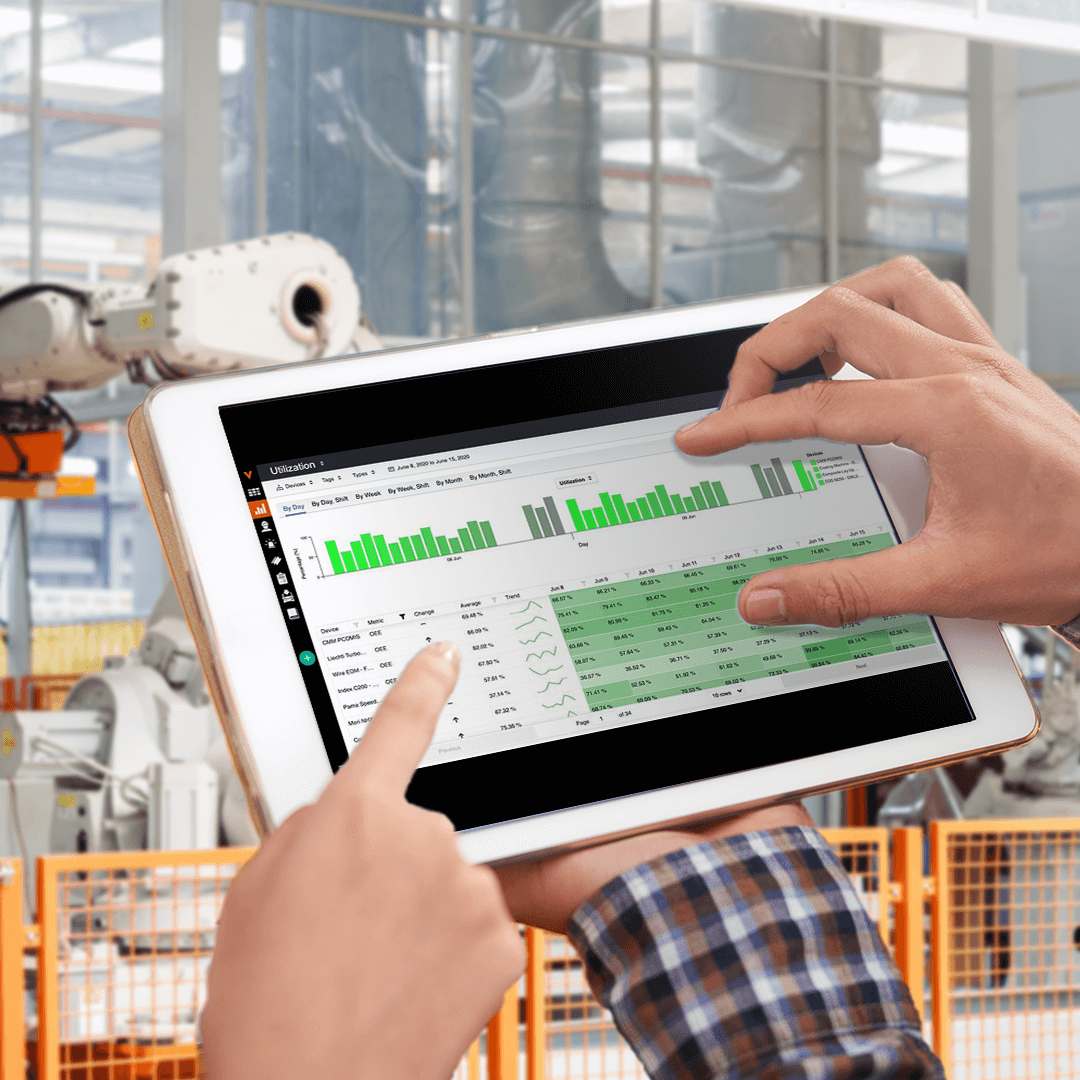
Start Improving your Manufacturing Operation Today

